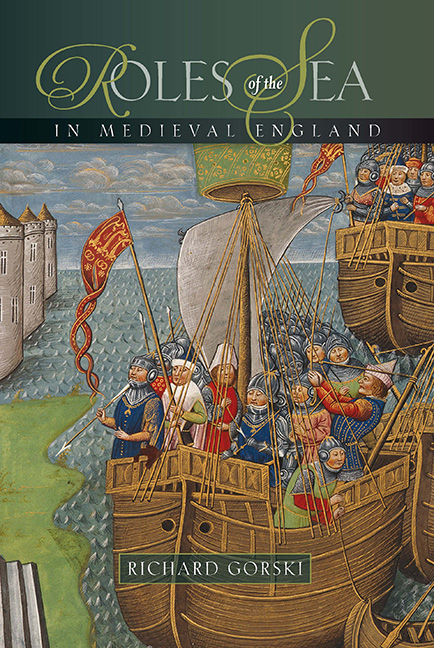Book contents
- Frontmatter
- Contents
- List of Contributors
- Map
- 1 Roles of the Sea: Views from the Shore
- 2 Changes in Ship Design and Construction: England in the European Mould
- 3 The Value of the Cinque Ports to the Crown 1200–1500
- 4 The Contribution of the Cinque Ports to the Wars of Edward II and Edward III: New Methodologies and Estimates
- 5 Keeping the Seas: England's Admirals, 1369–1389
- 6 The Cost-Benefit Analysis of a Fourteenth-Century Naval Campaign: Margate/Cadzand, 1387
- 7 Piracy and Anglo-Hanseatic Relations, 1385–1420
- 8 ‘Herring of Sligo and Salmon of Bann‘: Bristol's Maritime Trade with Ireland in the Fifteenth Century
- 9 How Much did the Sea Matter in Medieval England 167 (c.1200–c.1500)?
- Index
6 - The Cost-Benefit Analysis of a Fourteenth-Century Naval Campaign: Margate/Cadzand, 1387
Published online by Cambridge University Press: 05 September 2016
- Frontmatter
- Contents
- List of Contributors
- Map
- 1 Roles of the Sea: Views from the Shore
- 2 Changes in Ship Design and Construction: England in the European Mould
- 3 The Value of the Cinque Ports to the Crown 1200–1500
- 4 The Contribution of the Cinque Ports to the Wars of Edward II and Edward III: New Methodologies and Estimates
- 5 Keeping the Seas: England's Admirals, 1369–1389
- 6 The Cost-Benefit Analysis of a Fourteenth-Century Naval Campaign: Margate/Cadzand, 1387
- 7 Piracy and Anglo-Hanseatic Relations, 1385–1420
- 8 ‘Herring of Sligo and Salmon of Bann‘: Bristol's Maritime Trade with Ireland in the Fifteenth Century
- 9 How Much did the Sea Matter in Medieval England 167 (c.1200–c.1500)?
- Index
Summary
On 24 March 1387 an English fleet led by Richard Fitzalan, earl of Arundel, intercepted a much larger Franco-Flemish fleet in the Channel off Margate and, after a running battle, finally scattered the enemy ships at Cadzand off the Flemish coast. This was a rare English success of the period, as the military momentum had favoured the French since the resumption of the Hundred Years War in 1369. Arundel's victory also had a significant financial aspect. The Franco-Flemish fleet was performing convoy duty, escorting the annual wine shipment from La Rochelle to the Low Countries and most of the contemporary chroniclers comment on the capture by the English of vast quantities of wine, with estimates ranging from 8,000 to 32,000 tuns. Modern historians have generally been content to repeat these figures, with the addition of various cautionary caveats. However, and although no specific account relating to the sale of this wine and other captured goods survives, the disposal of the king's share of these prizes left numerous traces in the archives of the royal government. Furthermore, these same royal sources contain detailed information about the composition and cost of Arundel's army and fleet. The aim of this essay is therefore to conduct a cost–benefit analysis of the naval campaign from an English perspective, by comparing the known expenses of the campaign against the estimated values of the prizes taken. As well as the total profit or loss from the campaign, it will investigate the differing extent to which each of the individuals or groups involved benefited in order to provide a different perspective on the wider debate over the profitability of war in the Middle Ages, which have tended to focus either on macro-economic arguments or micro-economic case studies.
The Battle of Margate/Cadzand, 1387
After the spectacular English successes of the mid-fourteenth century, the 1370s had been a period of unalloyed disaster for the English. At sea, the French and their Castilian allies had launched damaging and repeated raids on southern England. More worryingly, Charles VI of France made serious preparations for an invasion of England in 1386, including assembling a massive fleet at Sluys.
- Type
- Chapter
- Information
- Roles of the Sea in Medieval England , pp. 103 - 124Publisher: Boydell & BrewerPrint publication year: 2012



